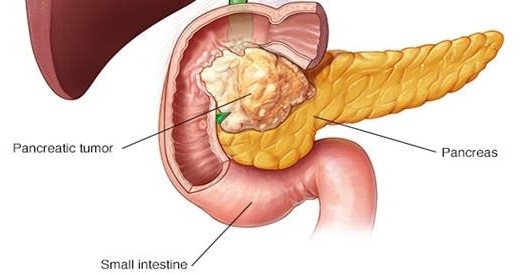
Pancreatic cancer is a malignant neoplasm originating from the epithelium of the glandular tissue or pancreatic ducts.
According to GLOBOCAN 2018, pancreatic cancer is the 11th most common cancer and the 7th most cancer-related death worldwide.
More than 1100 new cases of pancreatic cancer are detected annually in Kazakhstan, the mortality rate is about 800 cases per year. The incidence is increasing every year. It affects mainly the elderly, equally often both men and women.
Pancreatic cancer remains one of the major problems in abdominal oncology. Latent course, inefficiency of screening, inefficiency of chemotherapy, complexity of surgical intervention lead to high mortality in this branch of oncology. To date, pancreatic cancer remains one of the deadliest malignant neoplasms with a poor prognosis.
Causes of the disease and risk factors:
To date, the causes of pancreatic cancer are still not well known, although certain risk factors have been identified, such as tobacco smoking, diabetes mellitus, obesity, dietary factors, alcohol abuse, ethnicity, family history, and genetic factors.
Symptoms:
In the initial stages for many months, pancreatic cancer may be asymptomatic or accompanied by such minor manifestations as pain in the upper abdomen, heaviness and pain in the right hypochondrium. Pain can radiate (give) to the spine.
When observing such symptoms, you should immediately consult a doctor to prevent the progression of the disease.
In the process of tumor growth and spread of metastases, the following symptoms come to the fore:
Pain in the abdomen becomes more intense and increases at night. The sensations are intensified when the torso is tilted forward.
Jaundice, pruritus, dark urine and light stools. The skin acquires a greenish tint, while the temperature remains normal.
Violation of digestion, secretion of digestive enzymes, which is manifested by loss of appetite and weight loss, diarrhea, steatorrhea (fatty stools, oily stools).
Nausea and vomiting. With metastatic lesions of the stomach, gastric bleeding develops, while vomiting becomes the color of "coffee grounds", the stool becomes coal-black.
A history of recently diagnosed diabetes mellitus in combination with the indicated symptoms can be interpreted with a high degree of probability as a sign of cancer at an advanced stage.
In the later stages, ascites (accumulation of free fluid in the abdominal cavity) develops, which is characterized by an increase in the volume of the abdomen. The development of ascites indicates the spread of the process involving the peritoneum and portal vein.
Diagnosis of pancreatic cancer:
The main methods in diagnosis are:
Ultrasound of the abdominal cavity;
CT and MRI;
Biopsy (is a dangerous and complicated procedure).
Recommendations:
If you have the above symptoms, immediately contact a specialist who specializes in pancreatic cancer. It is important to understand that you can start the disease if you self-medicate. In the practice of oncologists, not a single case of pancreatic cancer has been cured by non-traditional methods!
It is important to undergo diagnostics (CT and MRI) in specialized centers, with radiologists who have “feedback”, that is, they work directly with those who operate.
Schedule surgery only in specialized centers that perform a sufficient number of pancreatic surgeries.
Pay attention to the presence in these centers of a multidisciplinary approach (a well-coordinated team - an anesthesiologist, surgeon, radiologist and other specialists that improve diagnostics, reduce postoperative complications, thereby increasing patient survival) in the diagnosis and treatment of patients.
NROC uses modern approaches in the treatment of tumor diseases and a multidisciplinary approach, including various combinations of surgical treatment, the use of anticancer drugs and other drugs (depending on the stage of the tumor), and radiation therapy. Here you can get qualified advice from highly qualified specialists and the whole range of diagnostic and treatment services.
If you have any questions or want to be examined and find out about your health, you can contact our clinic at the Call Center number 8(7172)702-911.




